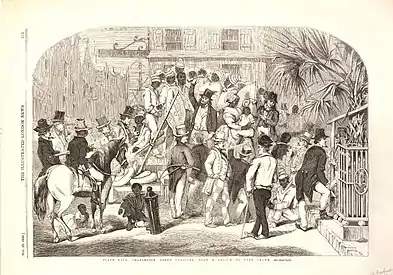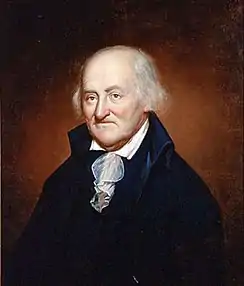Gadsden's Wharf
Gadsden's Wharf is a wharf located in Charleston, South Carolina. It was the first destination for an estimated 100,000 enslaved Africans during the peak of the international slave trade.[1] Some researchers have estimated that 40% of the enslaved Africans in the United States landed at Gadsden's Wharf.[2] At one point, the wharf was the largest in America.[3] The wharf is now home to the South Carolina Aquarium and the International African American Museum which will open in 2022.[4]

Construction of the Wharf & Importation of Enslaved People
Christopher Gadsden began constructing "Gadsden's Wharf" in the late 1760’s. In the years following, Gadsden expanded it, repaired it, and updated it until the break out of the American Revolution. In March of 1787, the South Carolina Legislature prohibited slave imports for three years, then extended the ban until 1803. Roughly, between 1803 and 1805, approximately 80 ships brought in over 14,000 people.[5] In 1806, the first newspaper ads featuring enslaved Africans for sale at Gadsden’s Wharf. Later the same year, on February 17, 1806, the city of Charleston passed an ordinance that all vessels carrying enslaved peoples had to land at Gadsden’s Wharf.

On January 1, 1808, Congress’ ban on slave imports took effect and Gadsden’s Wharf was put to other uses, though enslavers continued to trade in human beings until the 1860s.
Site of the International African American Museum
Long time mayor of Charleston, Joe Riley, first mentioned plans for a museum dedicated to the history of African Americans in Charleston. Nearly 20 years later, an October groundbreaking ceremony was celebrated after reaching their $100 million campaign goal.[6] Early advocates for the museum include former city of Charleston mayor Joe Riley, Congressmen Jim Clyburn, and now retired College of Charleston professor of history, Bernard Powers. The mission of the International African American Museum, or the IAAM, is to address slavery, but to also include history that predates the transatlantic slave trade and push into the present day. The city of Charleston, since the 2015 Emanuel Shooting, has come closer to grips with its involvement within the role of enslavement. Jim Crow, and the struggle for Civil Rights.
References
- "Gadsden's Wharf". International African American Museum. Retrieved 2019-12-18.
- Emerson, Anne (2019-09-17). "Gadsden's Wharf dig in Charleston reveals layers of history where slaves were once sold". WCIV. Retrieved 2019-12-18.
- Kimmelman, Michael (2018-03-28). "Charleston Needs That African American Museum. And Now". The New York Times. ISSN 0362-4331. Retrieved 2020-02-08.
- Emily Williams, Adam Parker. "One year after breaking ground, Charleston's African American Museum taking shape". Post and Courier. Retrieved 2020-10-27.
- Parker, Adam. "A brief history of Gadsden's Wharf". Post and Courier. Retrieved 2020-11-10.
- Williams, Emily. "Charleston breaks ground on International African American Museum". Post and Courier. Retrieved 2020-11-10.